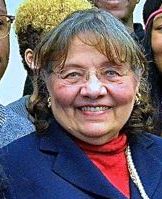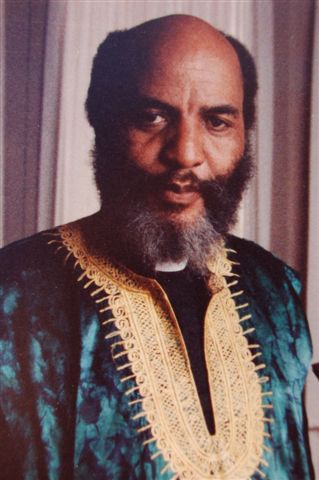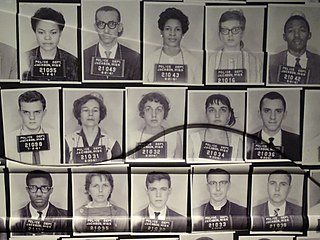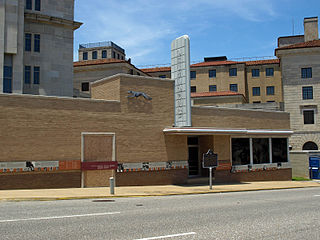This article provides insufficient context for those unfamiliar with the subject.(July 2020) |
Frederick Leonard is an American activist who was involved in the civil rights movement.
This article provides insufficient context for those unfamiliar with the subject.(July 2020) |
Frederick Leonard is an American activist who was involved in the civil rights movement.
| External video | |
|---|---|
Leonard participated in the Nashville sit-ins in 1960 while attending Tennessee State University. [1] He also participated in a Freedom Ride that started on May 17, 1961, and travelled from Nashville to Birmingham. [1] In a 1985 interview with Blackside Inc., which produced Eyes on the Prize, Leonard elaborated his experience on the Freedom Ride. When the Greyhound bus arrived at the terminal in Montgomery, he recalled "the Klan [came] through with their guns and their robes and everything", [2] but the Freedom Riders felt at ease because they were being escorted by police. As soon as they reached the terminal in Birmingham, he noticed the police had suddenly vanished and the terminal looked deserted and eerie. He said that after he noticed the police were gone, "all of a sudden, just like, whoosh, magic, white people, sticks and bricks [appeared]". [2] The riders were trapped; the bus was surrounded. There was a debate about whether or not to exit the back of the bus so that, " ...it wouldn't be so bad," [2] or to exit the front of the bus and "...take what was coming [to them]." [2]
Jim Zwerg, a white rider, decided to exit the bus first before everyone else and receive the full brutality of the mob. Leonard believes that Zwerg saved him and the other blacks on that bus. He stated in the Blackside Inc. interview: "I think that's what saved me, Bernard Lafayette, and Allen Cason 'cause Jim Zwerg walked off the bus...and they [the white mob] pulled him in...it's...like they didn't even see the rest of us." [2] After exiting the front of the bus unrecognized, Leonard, Lafayette, and Cason escaped and headed to Fred Shuttlesworth's house in Birmingham to seek safety and shelter. [2]
Leonard was born August 11, 1942. He later married Joy Reagon, who was also a Freedom Rider. [1] After his arrest and the court proceedings that followed, Leonard and his then-wife moved to Detroit to start a new life and later had a child. Leonard went to work at the Chrysler plant before returning to Nashville. He founded his own company selling Afro hair picks out of a building on Jefferson Street in what is now an affluent Germantown neighborhood. The company was successful, selling hair picks to drug stores up and down the Northeast.
That same night, after participating in the Freedom Ride, there was a rally at Abernathy's church in Birmingham. [2] All the members of the ride, including Leonard, Lafayette, and Cason, attended the rally. They were cautious because they had heard that the Ku Klux Klan was hunting them like wanted men even though "we [the riders] were the victims." [2] After hearing this, the riders went into the church to hide or disguise themselves. Someone suggested hiding in the choir, and "...[the riders] took off and ran up to the choir and put on little robes and started signing...[the Klan] came in and looked, didn't see [them], and they left." [2]
On May 24, 1961, a few days after the previous Freedom Ride, Leonard and other riders boarded a bus to participate in another Freedom Ride headed for Jackson, Mississippi. There were a lot of police at Jackson's bus terminal. Leonard and the others were allowed to go through the white portion of the bus station, which was rare in Mississippi. After the black riders successfully walked through the white side of the station, the riders were told to continue walking straight into the police car and were escorted to jail. The next day, the riders were sent to court to be sentenced. When attorney Jack Young got up to defend the riders, the judge turned his body to face the wall behind him. When the attorney finished, the local judge turned back around and without a second thought banged his gavel and sentenced the men to 60 days in Parchman State Penitentiary. In Eyes on the Prize, Leonard stated in his interview that the men and women sang for hours on end in the penitentiary because "...they were only allowed one book and that was the Bible, so we [the Freedom Riders] did a lot of singing." [3]
In 2008, Frederick Leonard and fourteen other Freedom Riders were honored by Tougaloo College (TSU) who had asked fourteen of the Freedom Riders to come to the college and receive honorary Doctor of Humane Letters degrees for choosing expulsion to patriation in Freedom Riders and fighting for the freedom of the black community in 1961. [4]
The TSU spoke to the Freedom Riders and expressed their gratitude to the Tennessee Board of Regents (TBR) for exemplifying the courage to "right this unforgivable wrong". [5]

James Morris Lawson Jr. is an American activist and university professor. He was a leading theoretician and tactician of nonviolence within the Civil Rights Movement. During the 1960s, he served as a mentor to the Nashville Student Movement and the Student Nonviolent Coordinating Committee. He was expelled from Vanderbilt University for his civil rights activism in 1960, and later served as a pastor in Los Angeles for 25 years.

James Leonard Farmer Jr. was an American civil rights activist and leader in the Civil Rights Movement "who pushed for nonviolent protest to dismantle segregation, and served alongside Martin Luther King Jr." He was the initiator and organizer of the first Freedom Ride in 1961, which eventually led to the desegregation of interstate transportation in the United States.

Frederick Lee Shuttlesworth was a U.S. civil rights activist who led the fight against segregation and other forms of racism as a minister in Birmingham, Alabama. He was a co-founder of the Southern Christian Leadership Conference, initiated and was instrumental in the 1963 Birmingham Campaign, and continued to work against racism and for alleviation of the problems of the homeless in Cincinnati, Ohio, where he took up a pastorate in 1961. He returned to Birmingham after his retirement in 2007. He worked with Martin Luther King Jr. during the civil rights movement, though the two men often disagreed on tactics and approaches.

Diane Judith Nash is an American civil rights activist, and a leader and strategist of the student wing of the Civil Rights Movement.

James Luther Bevel was a minister and leader of the 1960s Civil Rights Movement in the United States. As a member of the Southern Christian Leadership Conference (SCLC), and then as its Director of Direct Action and Nonviolent Education, Bevel initiated, strategized, and developed SCLC's three major successes of the era: the 1963 Birmingham Children's Crusade, the 1965 Selma voting rights movement, and the 1966 Chicago open housing movement. He suggested that SCLC call for and join a March on Washington in 1963. Bevel strategized the 1965 Selma to Montgomery marches, which contributed to Congressional passage of the 1965 Voting Rights Act.
Floyd Mann was an American law enforcement official, who served as Director of the Alabama Department of Public Safety between 1959 and 1963. He is best known for his interactions with the Freedom Riders who passed through Alabama in May 1961.

Bernard Lafayette, Jr. is an American civil rights activist and organizer, who was a leader in the Civil Rights Movement. He played a leading role in early organizing of the Selma Voting Rights Movement; was a member of the Nashville Student Movement; and worked closely throughout the 1960s movements with groups such as the Student Nonviolent Coordinating Committee (SNCC), the Southern Christian Leadership Conference (SCLC), and the American Friends Service Committee.

Freedom Riders were civil rights activists who rode interstate buses into the segregated Southern United States in 1961 and subsequent years to challenge the non-enforcement of the United States Supreme Court decisions Morgan v. Virginia (1946) and Boynton v. Virginia (1960), which ruled that segregated public buses were unconstitutional. The Southern states had ignored the rulings and the federal government did nothing to enforce them. The first Freedom Ride left Washington, D.C. on May 4, 1961, and was scheduled to arrive in New Orleans on May 17.

The Freedom Rides Museum is located at 210 South Court Street in Montgomery, Alabama, in the building which was until 1995 the Montgomery Greyhound Bus Station. It was the site of a violent attack on participants in the 1961 Freedom Ride during the Civil Rights Movement. The May 1961 assaults, carried out by a mob of white protesters who confronted the civil rights activists, "shocked the nation and led the Kennedy Administration to side with civil rights protesters for the first time."
Charles Person is an African-American civil rights activist who participated in the 1961 Freedom Rides. He was born and raised in Atlanta, Georgia. Following his 1960 graduation from David Tobias Howard High School, he attended Morehouse College. Person was the youngest Freedom Rider on the original Congress of Racial Equality Freedom Ride. His memoir Buses Are a Comin': Memoir of a Freedom Rider was published by St. Martin's Press in 2021.
James Zwerg is an American retired minister who was involved with the Freedom Riders in the early 1960s.
William E. Harbour was an American civil rights activist who participated in the Freedom Rides. He was one of several youth activists involved in the latter actions, along with John Lewis, William Barbee, Paul Brooks, Charles Butler, Allen Cason, Catherine Burks, and Lucretia Collins.

Joan Trumpauer Mulholland is an American civil rights activist who was active in the 1960s. She was one of the Freedom Riders who was arrested in Jackson, Mississippi in 1961, and was confined for two months in the Maximum Security Unit of the Mississippi State Penitentiary. The following year she was the first white student to enroll at Tougaloo College in Jackson, Mississippi and served as the local secretary of the Student Nonviolent Coordinating Committee (SNCC).
Henry "Hank" James Thomas is an African American civil rights activist and entrepreneur. Thomas was one of the original 13 Freedom Riders who traveled on Greyhound and Trailways buses through the South in 1961 to protest racial segregation, holding demonstrations at bus stops along the way.
Mary Salynn (Selyn) McCollum was the only white female Freedom Rider during the leg from Nashville, Tennessee to Birmingham, Alabama on May 17, 1961.
David J. Dennis is a civil rights activist active in the movement since the 1960s. He grew up in the segregated area of Omega, Louisiana, and worked as co-director of the Council of Federated Organizations (COFO), as director of Mississippi's Congress of Racial Equality (CORE), and as one of the organizers of the Mississippi Freedom Summer of 1964. Dave Dennis worked closely with both Bob Moses and Medgar Evers as well as members of SNCC, the Student Nonviolent Coordinating Committee. Dennis' first involvement in the Civil Rights Movement was at a Woolworth sit-in organized by CORE and he went on to become a Freedom Rider in 1961. More recently, Dennis has put his activism toward a new project; the Algebra Project, which is a nonprofit organization run by Bob Moses that aims to improve the mathematics education for minority children. Dennis also speaks about his experiences in the movement through an organization called Dave Dennis Connections.
Gary Thomas Rowe Jr., known in Witness Protection as Thomas Neil Moore, was a paid informant and agent provocateur for the FBI. As an informant, he infiltrated the Ku Klux Klan, as part of the FBI's COINTELPRO project, to monitor and disrupt the Klan's activities. Rowe participated in violent Klan activity against African Americans and civil rights groups.
Catherine Burks-Brooks is an American civil rights movement activist, teacher, social worker, jewelry retailer, and newspaper editor.
Dion Tyrone Diamond is an American civil rights activist.

On 14 May 1961, during the American Civil Rights Movement, a mob of Ku Klux Klan members attacked civil rights Freedom Riders in Birmingham, Alabama after two buses were setting out to travel the south in protest of their civil rights following the Supreme Court case saying bus segregation was unconstitutional.